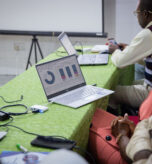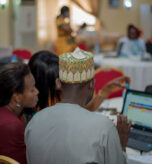Health inequities have been described by the World Health Organization as disparities in health status/outcomes or health resource distribution among different population groups. This may result from varying socioeconomic situations in which individuals are born, grow, live, and work.[1]
These socioeconomic factors such as no access to quality education, good sanitation, stable employment, and affordable housing have further ensured that quality healthcare is unaffordable and almost inaccessible to over 133 million people who live below the poverty line.
A recent study conducted by the University of Southern California has revealed that poverty has remained a persistent impediment to achieving equitable health outcomes worldwide.[2] In fact, global governing bodies are beginning to increasingly recognize the links between health inequities, poverty, and sustainable development.
Highlights of the UNDP 2022 Multidimensional Poverty Index (MPI) survey has revealed that 63% of Nigerians (133 million people) suffer from multidimensional poverty, which means they face deprivation across a wide range of indicators, including access to basic healthcare, high-quality education, socioeconomic inclusion, affordable housing, and living below the standard of living that is acceptable to society. The National MPI is currently at an all-time high of 0.257 as against the global benchmark which is calculated with 0 indicating no poverty and 1 indicating complete poverty and deprivation. Clearly, poor people in Nigeria lack access to basic healthcare, quality education, good sanitation, and affordable housing.[3]
The World Health Organization has maintained over time that health financing is fundamental to the ability of health systems to maintain and improve healthcare. It is therefore quite disheartening to note that twenty-three years after Nigeria’s National Health Insurance Scheme (NHIS) was inaugurated, gaping inequities in financial access to healthcare have continued to plague the nation with poor communities being the worse for it.[4]
Health insurance has historically been treated with poor reception in the country. Many Nigerians are reluctant to participate in the scheme due to their suspicion of being defrauded and fear of wasting their money.[5] Despite the launch of the National Health Insurance Scheme (NHIS) as part of the country’s efforts to achieve universal health coverage, less than 5% of Nigerians, mostly federal government workers, are insured under this scheme.[6] Private health insurance (PHI) covers less than 3% of the Nigerian population.[7] As a result, over 90% of Nigerians still pay out-of-pocket for healthcare, which is supported by statistics from both the World Health Organization and the World Bank.[8]
Sydani conducted a webinar in 2022 on the importance of highlighting the role of public and private health insurance agencies in implementing an effective health insurance system to address Nigeria’s increasing health inequities. During the webinar, Chinwe Ibe, a senior executive at the National Health Insurance Agency, stressed the importance of government involvement in reducing health inequities and ensuring universal health coverage regardless of socioeconomic status.
Her keynote address focused heavily on the newly enacted National Health Insurance Authority (NHIA) Act 2022, which mandates health insurance for all, just as it does in the UK and Russia. She stressed that the most significant feature of the revised Act is its creation of the Vulnerable Group Fund, which aims to provide free healthcare to the poor, the elderly, pregnant women, children under 5, and those who cannot afford it. According to her, the Act will cover about 83 million poor Nigerians who cannot afford premiums for healthcare.[9] The Vulnerable Group fund will be financed through the government’s Basic Healthcare Provision Fund (BHCPF), the Health Insurance Fund, grants, donations, gifts, and from private sector investments.
By adding new impetus to the government’s longstanding commitment to ensuring universal healthcare for all, the Act brings this promise to life. The chief aim here is to reduce the dependency on out-of-pocket payments as they largely affect the poor population and therefore are a manifestation of inequity within the healthcare system. Through the Act, every Nigerian will have access to quality healthcare services, families will be protected from the financial hardship of huge medical bills, and there will be equitable distribution of healthcare costs among different income groups across the nation. The Act also promises to maintain high standards of healthcare service delivery by coordinating and regulating health insurance services, ensuring efficiency in healthcare delivery, and improving private sector participation in the provision of healthcare services.
Dr. Babajide Oyeduntan, a representative of Hygeia, one of the Health Maintenance Organisations in the country and a panelist on the webinar, outlined the roles of private health insurance agencies in reducing health inequities and providing universal health coverage for all. These included: the provision of financial protection and broad access to healthcare for small usage fees; leveraging market power to obtain price concessions from clinicians and hospitals; nudging individuals to prioritize healthcare and the need to invest in affordable health insurance packages; enhancing and ensuring the quality of healthcare services provided by clinicians and hospitals.
The NHIA Act 2022 is a much-needed health financing intervention in Nigeria that could potentially reduce poverty and close inequity gaps. The link between poverty and poor health is well-established, with studies showing that an absolute lack of economic resources and relative deprivation can have adverse health effects.[10] Moreover, poverty can intersect with other factors associated with social position, such as sex, race, disability, and others to exacerbate health disparities. Additionally, ill-health can also perpetuate poverty, creating a vicious cycle. Given that the health sector has limited control over many of the factors that influence health, it faces the practical challenge of working with other sectors to interrupt this cycle. The NHIA Act 2022 could be an important step towards this goal, as it addresses the issue of health financing and could potentially improve access to healthcare for low-income individuals and marginalized groups in Nigeria.
Babayemi Olakunde, of the Department of Community Prevention and Care Services, National Agency for the Control of AIDS, Abuja, once said, “…a nation’s first wealth is its health.” This underscores the importance of having an effective and functional health insurance system to ensure equitable access to healthcare for all members of the population.[11]
The webinar was an excellent platform to emphasize the government’s responsibility to provide universal health coverage as well as lead the mobilization of private health insurance agencies to provide affordable healthcare to Nigerians. As we approach 2030, this commitment must remain a top priority for successive governments as we work towards achieving Universal Health Coverage (UHC).[12]
REFERENCES
1) WHO (2007). The World Health Organization on Health Inequality, Inequity, and Social Determinants of Health. Population & Development Review, 33 (4), 839-843.
2) BravemanI, P., Gruskin, S., Poverty, equity, human rights and health. Bulletin of the World Health Organization. https://www.scielosp.org/article/bwho/2003.v81n7/539-545/en/
3) Nigeria Bureau of Statistics. (2022 Multidimensional Poverty Index survey). https://nigerianstat.gov.ng/news/78#:~:text=Highlights%20of%20the%202022%20Multidimensional,quarter%20of%20all%20possible%20deprivations
4) WHO (2021). Universal Health Coverage (UHC). Retrieved from: https://www.who.int/news-room/fact-sheets/detail/universal-health-coverage-(uhc)
5) Atobatele, S., Omeje, O., Ayodeji, O., Oisagbai, F. and Sampson, S. (2022) Situational Analysis of Access to Essential Healthcare Services in Nigeria: Implication for Trans-Sectorial Policy Considerations in Addressing Health Inequities. Health, 14, 553-575. Doi: 10.4236/health.2022.145041.
6) Onoka CA, Onwujekwe OE, Uzochukwu BS, Ezumah NN. Promoting universal financial protection: constraints and enabling factors in scaling-up coverage with social health insurance in Nigeria. Health Res Policy Syst. 2013;11:20. doi: 10.1186/1478-4505-11-20.
7) World Health Organization. World Health Statistics 2015. Geneva: World Health Organization; 2015.
8) Preker A, Langenbrunner J, Jakab M. Rich-poor differences in health care financing. In: Dro D, Preker A, eds. Social Re-insurance – A New Approach to Sustainable Community Health Care Financing. Washington: World Bank; 2002.
9) Brown-Osae, A. (2022) Nigeria’s New Health Insurance Law Targets 83 million Vulnerable Citizens. Bloomberg Africa Edition. Retrieved from: https://www.bloomberg.com/news/articles/2022-05-19/nigeria-s-health-insurance-law-targets-83m-vulnerable-citizens#xj4y7vzkg
10) BravemanI, P., Gruskin, S., Poverty, equity, human rights and health. Bulletin of the World Health Organization. https://www.scielosp.org/article/bwho/2003.v81n7/539-545/en/
11) Olakunde B. Public health care financing in Nigeria: which way forward? Ann Nigerian Med 2012;6:4-10.
12) WHO (2020). WHO Supports Nigeria to Monitor Health Inequities. Retrieved from: https://www.aa.com.tr/en/africa/who-supports-nigeria-to-monitor-health-inequities/2210009




